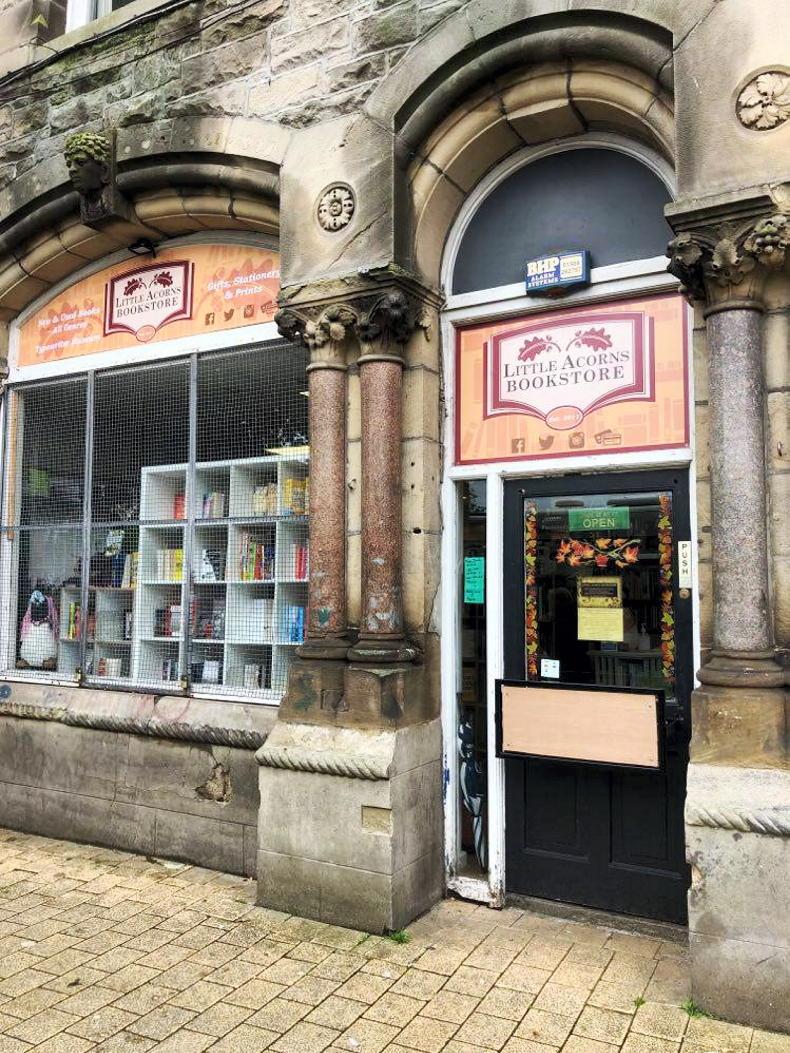This is my final piece in this short series on writing memoir. I’m writing it at the end of May when, if I step into the garden, the thing that greets me on a warming wind is the smell of the lilac. By the time you read this, it may already be past. It is such an evocative smell of the start of summer and its brevity, like other blossoms, reminds us how intensely we must enjoy it since it will soon be gone.
Whitman wrote of the lilac and memory in his long poem, “When Lilacs Last in the Dooryard Bloom’d”. This was an elegy to Lincoln, who died in April 1865, but the poem expands into an elegy for all the dead of the American Civil War in which the poet had served as a nurse – the sprig of fragrant lilac left as an offering, a balm against suffering and death and in memory of the lost:
“Passing, I leave thee lilac with heart-shaped leaves,
I leave thee there in the door-yard, blooming, returning with spring.”

Poet, creative writing teacher and memoir mentor, Maureen Boyle. \ Lindsay Allen
For me the smell of the lilac is at once the smell of the month of May, the May altars of my childhood, the flower that was part of the “flowers of the fairest” offered to Mary. But it is also now the smell I associate with my father’s death since he died in May.
Evocative trigger
Smell is one of our most evocative triggers of memory – it is such a powerful sense and it is linked strongly to taste. Proust wrote famously and at length of the way in which sensual apprehension can give us access to the past in a way that consciously trying to remember does not. He compared the smells and tastes of things to souls, “ready to remind us, waiting and hoping for their moment amid the ruins of all the rest … in the tiny and almost impalpable drop of their essence, the vast structure of recollection.” And so, when his mother gives him the little madeleine cake to dip into his tea on a winter day, a whole world of his childhood unfurls perfect and full before him, like a Japanese flower sculpture in water.
In her poem, “An Anatomy of Smell”, poet Sinead Morrissey thinks of how the different houses of friends had their own smells:
“Hallways of childhood friends had smells, family smells
that followed family members into school as stowaways
in coat sleeves and lunchboxes, slipped giveaways
of origin, of who made who, of what was left to tell
made suddenly clear in every detail as if recently rained on.
One was made of wine; one walked crushed by blankets even under sun;
one carried the antiseptic of insulin packets and coconut dust
about her, in her hair, and later what I knew by force
to be the thin, hard odour of divorce –
shipyard metal caving under sparks, spit, boot polish and rust.”
My husband, Malachi O’Doherty, wrote a book, Under His Roof, about his father Barney, a Donegal man who was transplanted to Belfast but retained the markings of his country life:
“I have no images to recall of Barney in the bath … He smelt of alcohol and tobacco, of wet wool and sweat, of old leather and new polish. His hands were stained with oil and nicotine … Trace elements of sauce and vinegar, wiped from the mouth with a cuff; old cotton that was farted through a thousand times since those trousers were last washed; wood smoke, tobacco and turf smoke, excretions, some redolent of the earth, some of the sea.
Barney just exuded the impress of his life.”
Freewriting exercise
Thinking of how to unleash the power of involuntary memory takes us back to the start and the exercise of freewriting I suggested in the first piece – as a way to try to invite or allow such moments. This week is a reminder to harness sensual memory and associations when you can, in an attempt to conjure the past. You might set yourself the task of choosing six things from your house or garden that have strong smells and write down your immediate associations with them.
And finally, a poem as my own memory and a return to the lilacs, a memory of a time when the loss of taste and smell was a signal of the horror we were all living through. It’s been lovely to share these ideas with you and I wish you all the very best in your writing.
[Syringa vulgaris]
Hope arrives with the lilacs
Stirs in their heart leaves
In the grey/purple branches of their Irish name
In the deep blue of the Persian
There, a sign of mourning.
Syringa the hollowed wood that made a pipe
Hence both syringe and syrinx –
The organ of voice in birds.
Hope arrives with the lilacs,
Even as many mourn
That soon we will wander home
On a summer night
Stop at the gate
Drunk on warm wine and fond friends
Happy we can smell their heady scent
Before heading in, to bed.
About: Maureen Boyle is a poet and memoir mentor with the Irish Writers’ Centre. If you would like to share a piece of writing inspired by this exercise for possible publication, email maria@farmersjournal.ie We will publish a selection of reader contributions later this summer.
Read more
Memoir: using an old photograph as a writing prompt
Memoir series: writing about women
This is my final piece in this short series on writing memoir. I’m writing it at the end of May when, if I step into the garden, the thing that greets me on a warming wind is the smell of the lilac. By the time you read this, it may already be past. It is such an evocative smell of the start of summer and its brevity, like other blossoms, reminds us how intensely we must enjoy it since it will soon be gone.
Whitman wrote of the lilac and memory in his long poem, “When Lilacs Last in the Dooryard Bloom’d”. This was an elegy to Lincoln, who died in April 1865, but the poem expands into an elegy for all the dead of the American Civil War in which the poet had served as a nurse – the sprig of fragrant lilac left as an offering, a balm against suffering and death and in memory of the lost:
“Passing, I leave thee lilac with heart-shaped leaves,
I leave thee there in the door-yard, blooming, returning with spring.”

Poet, creative writing teacher and memoir mentor, Maureen Boyle. \ Lindsay Allen
For me the smell of the lilac is at once the smell of the month of May, the May altars of my childhood, the flower that was part of the “flowers of the fairest” offered to Mary. But it is also now the smell I associate with my father’s death since he died in May.
Evocative trigger
Smell is one of our most evocative triggers of memory – it is such a powerful sense and it is linked strongly to taste. Proust wrote famously and at length of the way in which sensual apprehension can give us access to the past in a way that consciously trying to remember does not. He compared the smells and tastes of things to souls, “ready to remind us, waiting and hoping for their moment amid the ruins of all the rest … in the tiny and almost impalpable drop of their essence, the vast structure of recollection.” And so, when his mother gives him the little madeleine cake to dip into his tea on a winter day, a whole world of his childhood unfurls perfect and full before him, like a Japanese flower sculpture in water.
In her poem, “An Anatomy of Smell”, poet Sinead Morrissey thinks of how the different houses of friends had their own smells:
“Hallways of childhood friends had smells, family smells
that followed family members into school as stowaways
in coat sleeves and lunchboxes, slipped giveaways
of origin, of who made who, of what was left to tell
made suddenly clear in every detail as if recently rained on.
One was made of wine; one walked crushed by blankets even under sun;
one carried the antiseptic of insulin packets and coconut dust
about her, in her hair, and later what I knew by force
to be the thin, hard odour of divorce –
shipyard metal caving under sparks, spit, boot polish and rust.”
My husband, Malachi O’Doherty, wrote a book, Under His Roof, about his father Barney, a Donegal man who was transplanted to Belfast but retained the markings of his country life:
“I have no images to recall of Barney in the bath … He smelt of alcohol and tobacco, of wet wool and sweat, of old leather and new polish. His hands were stained with oil and nicotine … Trace elements of sauce and vinegar, wiped from the mouth with a cuff; old cotton that was farted through a thousand times since those trousers were last washed; wood smoke, tobacco and turf smoke, excretions, some redolent of the earth, some of the sea.
Barney just exuded the impress of his life.”
Freewriting exercise
Thinking of how to unleash the power of involuntary memory takes us back to the start and the exercise of freewriting I suggested in the first piece – as a way to try to invite or allow such moments. This week is a reminder to harness sensual memory and associations when you can, in an attempt to conjure the past. You might set yourself the task of choosing six things from your house or garden that have strong smells and write down your immediate associations with them.
And finally, a poem as my own memory and a return to the lilacs, a memory of a time when the loss of taste and smell was a signal of the horror we were all living through. It’s been lovely to share these ideas with you and I wish you all the very best in your writing.
[Syringa vulgaris]
Hope arrives with the lilacs
Stirs in their heart leaves
In the grey/purple branches of their Irish name
In the deep blue of the Persian
There, a sign of mourning.
Syringa the hollowed wood that made a pipe
Hence both syringe and syrinx –
The organ of voice in birds.
Hope arrives with the lilacs,
Even as many mourn
That soon we will wander home
On a summer night
Stop at the gate
Drunk on warm wine and fond friends
Happy we can smell their heady scent
Before heading in, to bed.
About: Maureen Boyle is a poet and memoir mentor with the Irish Writers’ Centre. If you would like to share a piece of writing inspired by this exercise for possible publication, email maria@farmersjournal.ie We will publish a selection of reader contributions later this summer.
Read more
Memoir: using an old photograph as a writing prompt
Memoir series: writing about women









SHARING OPTIONS